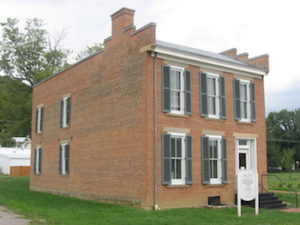
John Parker House (restored)
*On this date in 1827, we celebrate the birth of John P. Parker. He was a Black businessman and abolitionist.
From Norfolk, Virginia, he was the son of a white father and a black slave mother. He was sold to a slave agent from Richmond, Virginia, at age eight, who then sold him to a slave caravan that took him to Mobile, Alabama. In Mobile, Parker was purchased by a physician who employed him as a house servant, where he was taught to read and write. In 1843, the sixteen-year-old Parker accompanied the physician's sons north to attend college; however, Parker was returned to Mobile when the owner feared the slave would escape to the north.
There, he was apprenticed to a foundry and iron manufacturer and learned the trade of plastering. After attempting to escape, he was returned to the physician. While in Alabama, Parker’s skill as a molder maker caused ill will with his fellow workers, and he was transferred to a New Orleans foundry where he alienated his co-workers and was released. Fearing that he would become a field hand, Parker worked as a stevedore for two years at a foundry and at the New Orleans shipping docks. He purchased his freedom from his earnings; the price of freedom for John P. Parker in 1845 was $1800.
That year, Parker obtained a pass to travel north to Indiana, where he was offered work in foundries near New Albany or Jefferson, Indiana. Near Cincinnati, Parker began his career as a "conductor" on the Underground Railroad. Working with a local barber, Parker once moved two young girls from Kentucky to freedom in Indiana and Ohio. As an abolitionist, he devoted his life in Kentucky to scouting on both sides of the Ohio River to take care of the helpless slaves. They had found their way to Ohio and could not get across to fighting for them against their pursuing masters. Around 1848, Parker left Cincinnati and opened a small general store in Beachwood Factory, Ohio.
In 1850 he moved to Ripley, Ohio, which was also the home of Reverend John Rankin, abolitionist and operator of the Underground Railroad there. Parker worked independently of Rankin and, before the Emancipation Proclamation, took an active role in removing an estimated 1000 slaves from bondage. Unlike other abolitionists, Parker remained separate from organized church groups, which he viewed as an “enemy of the people.” In 1854, Parker built a small foundry near Ripley, Ohio, which expanded and, at its peak, employed up to twenty-five men. Following federal approval of Colored troops for Union service in 1863, Parker became a recruiter for the 27th Regiment, U.S. Colored Troops (one of two Ohio units).
Parker's foundry also furnished castings to the war effort. Parker's business, known as the Ripley Foundry and Machine Company, manufactured slide valve engines and reapers. In 1871, an establishment known as the Phoenix Foundry, which John P. Parker and William Hood owned, was listed in the records of Brown County, Ohio. Parker also received a patent for his soil pulverizer in 1890. The foundry was still operating in 1981, though no longer under family ownership. Parker remained in the foundry business until his death on January 30, 1900.
The John P. Parker Historical Society,
P.O. Box 246,
Ripley, OH 45167